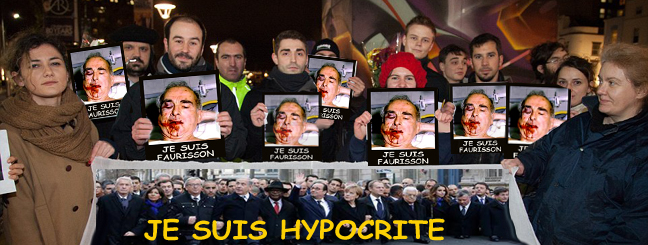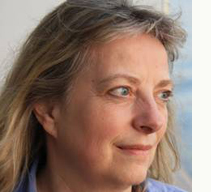
Canadian Concern . . .
Growing Awareness of Freedom of Speech

Friends of Freedom Newsletter - Keltie Zubko
“We don’t absolutely make it illegal to talk about certain subjects,
we just make it so dangerous, with so many obscure and complex rules
that no one dares to go there. Somewhat like gun laws. We don’t overtly
ban all fire arms. No, we would find too much resistance and rational
criticism. The hypocritical Canadian way is simply to regulate them out
of existence, gradually, just like controversial speech. Hate laws mean
whatever we say they mean. We will only tell you after you say something
if you have offended. This is the process of gradual Marxism. The state
gradually disarms the citizen of their weapons and their free speech by
slow degrees so that absolute control both physical and mental will be
with the state.”
There could hardly have been a more dramatic or heart-breaking way to
start 2015 with a spot light on the essential underpinning of free
societies, than with the murders of the satirists at Charlie Hebdo
in Paris this month where it appears that the writers and artists and
body-guards were assassinated for their views.
The extreme censorship of killing those who express opinions in
opposition to one’s own cannot fail to engage the whole world’s
attention upon the issue of freedom of expression.
Those who have been paying attention and noticed the growing
unwillingness of even the so-called “democracies” to uphold the
principles of free speech will not be surprised.
Censorship by killing the messenger is only the extreme form of what
goes on, and is continuing to go on, even today, in Canada, the United
States, and other so-called “free” countries of the world where censors
seem to be growing in power. You would be hard-pressed to find any
country that is not increasing laws, regulations and unspoken strictures
against certain speech. There’s a growing convention that holds a
certain kind of “tolerance” to be a greater value than freedom of
expression.
This is true from our public lives to our private sectors, from our
kindergartens to our supposed bastions of free intellectual enquiry, the
universities.
Jokes seem to be drawing heat and censured more than ever, but watch out
if you dare touch those certain forbidden topics.
It was quite remarkable to see all the journalists and politicians and
everyone with a Twitter or Facebook account adopt the identity of
Charlie Hebdo, with the ubiquitous signs that suddenly popped up
everywhere. How sad to realize what it would take for most of these
people to notice the issue of free speech, much less take a stand for
it.
Only the visceral shock of the most absolute form of censorship finally
motivated some action, albeit the token action of changing profile
pictures on social media accounts. When it got to the degree of
republishing Charlie Hebdo’s cartoons, there was much more
reluctance. At least the issue became a cause célèbre for a period of
time, debated and argued along with all the political, religious,
social, philosophical problems that co-exist with the issue of free
speech.
These are highlighted by such events as the arrest of over 70 people in
France for alleged hate crimes, within days of the Paris march. Their
crimes are supposedly defending or glorifying terrorism, and the most
famous of these is by a comedian Dieudonne M’bala M’bala, charged over a
Facebook post saying “I feel like Charlie Coulibaly.” This is a
combination of the names of magazine Charlie Hebdo and Amedy Coulibaly,
the attacker who killed four hostages at the supermarket. Dieudonne also
has repeatedly been prosecuted for anti-Semitism. He explained the post
in an open letter to the French Interior Minister Bernard Caseneuve,
saying he was being silenced by free-speech hypocrisy. “You consider me
like Amedy Coulibaly when I am no different from Charlie.” It appears
that only approved people are allowed to say “Je Suis Charlie.”
Meanwhile, there is a contest in Iran, seeking entries of cartoons about
the holocaust. We shall see how many “Charlies” enter that!
The big question, of course, is when it comes to defending a few
individuals whose freedom of speech is still at risk, today, here and
now. We’ll see if any of the brave journalists or marchers will put
their money where their Facebook status is!
Who will donate, just for example, to the defense fund of Arthur Topham,
charged under section 319(2) of the Canadian Criminal Code, so he can
hire a lawyer and maybe get a fair trial, when the long process of a
criminal trial (after first being put through the human rights act’s
wringer) finally takes place this coming October in Northern B.C. for
his website RadicalPress.com? He and his family have been fighting for
freedom of speech for years now, but of course the “Charlies” may not
find his ideas palatable.
When I heard about the deaths at Charlie Hebdo, the first image
that came into my mind was the smashed and bleeding face of Robert
Faurisson, from Lyons, France, beaten by some young men for his opinions
about historical revisionism that he had and still has put forth for
decades. That beating, in September 1989, was hardly noticed except by
fellow revisionists, and certainly no media would dare to actually
defend Dr. Faurisson’s right to speak his opinions, unmolested.
Then I thought about the fire-bombing of Ernst Zündel’s house in
downtown Toronto that resulted in the partial destruction of his house
and his many precious possessions, like his library of rare books. No
one died, it’s true. The rationalization was that he deserved it. I
don’t recall the media stepping in to condemn this kind of violent
censorship. No one would ever want to say “I am Zündel”; his opinions
were too far beyond the pale.
I also remembered years of living with death threats when my husband
Doug Christie dared defend people charged with word and opinion crimes.
Our office was vandalized, we were attacked on the way to court,
threatened with horrific consequences, and very seldom did Doug get any
credit for defending principles fundamental to a free and democratic
society, i.e. freedom of speech. No, he was reviled for sympathizing too
closely with his clients. He lived and died with the tagline “lawyer to
holocaust deniers, neo-Nazis and hate mongers.”
If the journalists and cartoonists of Charlie Hebdo have made one thing
clear with their courage to express themselves and in their tragic
deaths, it is to bring the debate out where it belongs, where we all
must come to terms with what we value, what we will fight for, what the
limits might be, what we are prepared to accept or not accept.
What is freedom? What does it really mean? How much do you care about
freedom? What values do you place above freedom? Many people believe we
need a society where no one offends anyone else, where we maintain a
patina of niceness from kindergarten to university, the workplace and
government and on to the grave. This seems to be the trend right now.
Ask the Dentistry Students at Dalhousie or the potential law students
who want to go to their Christian Trinity Western University and then
practice law in BC.
I contend that no matter how unpleasant the free expression of ideas may
be, it is necessary to help us understand what precisely we do believe
and think. Freedom of expression is necessary to create the great pool
of invention and creativity responsible for enhancing our lives as human
beings in every field imaginable, even religion.
After seeing years of the creeping advances of thought police throughout
the world under whatever guise they take and which has culminated in
this most extreme and terrible attempt to kill ideas, I think that the
consequences of censorship are far worse.
Keltie Zubko is the editor and publisher of Friends of Freedom a private
newsletter for the supporters of the Canadian Free Speech League,
dealing in cases of censorship and persecution of political, religious,
and historical opinion. She is also the wife of former “Battling
Barrister” Douglas Christie who tragically passed away in March of 2013.

Keltie can be reached at: kzubko@shaw.ca
and on Twitter at:
https://twitter.com/keltiezubko
Contact Us